STATEHOUSE REPORT | ISSUE 23.13 | March 29, 2024
BIG STORY: Compromise may be in sight for predatory lending reform
MORE NEWS: Action moves to Senate on controversial energy bill
LOWCOUNTRY, Ariail: The wheels on the bus …
COMMENTARY, Brack: Justice delayed in S.C. congressional map is justice denied
SPOTLIGHT: AT&T
MYSTERY PHOTO: Oddest brain teaser ever
FEEDBACK: Open-carry cartoon is fear-mongering
Compromise in sight for predatory lending reform
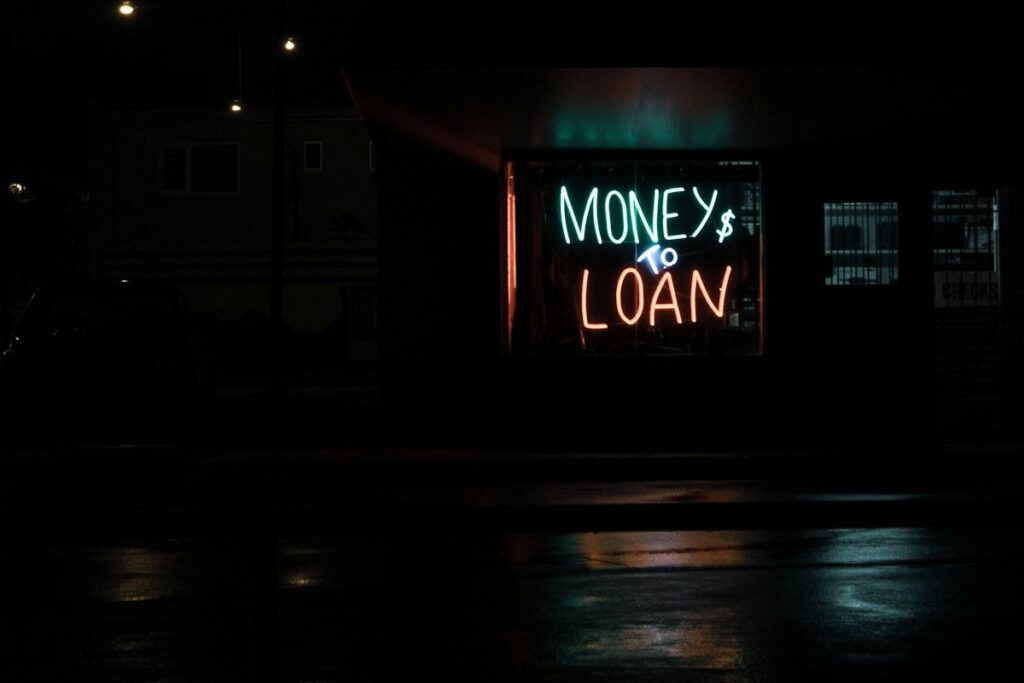
By Jack O’Toole | The primary sponsor of a bill to reform predatory lending practices in South Carolina says recent reports of its death are at least somewhat exaggerated.

“I think there’ve been some good discussions,” Beaufort Republican Senator Tom Davis told Statehouse Report in a Thursday interview. “I don’t know where they’re going to finally end up, but my sense is, they may end up in a place where … we can reach a compromise.”
His bill, dubbed the Predatory Trade Practices Act, aims to rein in what supporters describe as egregious misconduct by some short-term lenders that has saddled some 400,000 South Carolinians with high-interest-rate loans they likely may never be able to repay, according to a 2023 study by Coastal Carolina University.
Despite a bipartisan 10-7 thumbs up for the bill, S. 910, from the Senate Labor, Commerce and Industry Committee, the legislation has been stalled since February 15, when state Sen. Wes Climer, R-York, raised a parliamentary objection when it was introduced on the floor. What that means in practice is that the bill cannot be brought up for debate until either Climer voluntarily lifts his hold or two-thirds of the Senate votes to proceed without his agreement.
Davis, a veteran legislator who knows how to count votes, says the two-thirds option is unlikely. But when asked whether a compromise that could win Climer’s support was still a realistic possibility, he was more optimistic.
“Wes Climer is a very principled lawmaker, and he has some legitimate and valid concerns,” Davis said. “I respect his opinion on this.”
Statehouse Report was unable to reach Climer on Thursday. But chief among his concerns, Davis says, is that current reform efforts, no matter how well-intended, could have the unintended consequence of making it impossible for poorer residents to access credit when they need it most. And while Davis disagrees – he thinks the evidence from states that have reformed predatory lending provides compelling evidence to the contrary – he calls that “an honest difference of opinion.”
In fact, it’s by addressing Climer’s concerns directly, with a sincere willingness to compromise, that Davis believes he may still be able to find a path forward.
Because, regardless of party or ideology, virtually everyone involved agrees on one thing: too many South Carolinians are ending up with loans they can’t possibly pay back.
‘A debt trap they literally never get out of’
Susan Stall is the head of the S.C. Fair Lending Alliance, a statewide coalition of faith-based and nonprofit consumer advocacy organizations that has been working to pass predatory lending reform for the past four years.
She pointed to the Coastal Carolina study to illustrate the scope of the problem – 10% of the state’s adult population with outstanding installment, payday and title loans carrying an average interest rate of 127%. Due to high interest rates, which can exceed 300%, lenders must roll the loans over again and again, paying the interest but never reducing the principal.
“People are getting caught in a debt trap they literally never get out of,” she told Statehouse Report. “They’re not getting a loan and paying it over the original term. It’s just being renewed every two to three months.”
That concern is echoed by Charmaine Fuller Cooper, state director of the American Association of Retired Persons (AARP). She says she regularly sees senior citizens who have lost not just their Social Security checks but also their cars and housing after taking out deceptively advertised loans to pay for prescriptions or other necessities.
“People on fixed incomes are really being taken advantage of,” she said.
To help people understand how that happens, the nonprofit S.C. Appleseed Legal Justice Center uses the following example: A $3,000 loan with a two-year term at 300% APR – again, a not-unheard-of rate in South Carolina – would require the borrower to make 24 payments of $753, for a total of $18,072.
“I’ve been representing low-income borrowers my entire career,” said Appleseed attorney and director of policy Sue Berkowitz. “And it’s just profoundly sad and frustrating to see how much money gets taken from folks who can least afford it in order to make some industries incredibly profitable.”
Nevertheless, other groups in the state share the worry that poor citizens could find themselves cut off from credit entirely if reformers miscalculate.
“(The bill) is a bad deal for consumers,” said Bryce Fiedler, senior policy analyst for the South Carolina Policy Council, a think tank based in Columbia. “For those with subpar credit, it will become harder to learn about or access financial services. These loans fill a gap in the marketplace for non-prime borrowers who aren’t served by banks.”
The outlines of a compromise?
The bill as written avoids a hard cap on interest rates, which senators and advocates agree would be a non-starter in the legislature. Instead, it attempts to achieve reform by regulating four specific industry practices that supporters see as particularly odious:
- The mailing of so-called “live checks” – that is, unsolicited checks that become high-interest loans when cashed or deposited – would be prohibited.
- Strict limits on the number of times a loan can be renewed.
- Lenders would be required to conduct basic due diligence to determine whether a potential borrower could repay a loan before offering it.
- Lenders would no longer be allowed to use sophisticated consumer data mining to market directly to individuals experiencing financial hardships.
Based on his discussions, Davis suspects a potential compromise would probably involve dropping the due diligence and data-driven marketing provisions to save the prohibition on live checks and the limits on renewals.
But any such compromise would have to include industry leaders.
“I want the lending industry to say, ‘This is what we need to do to weed out the bad actors in our industry.’ And I would expect their active support for passing the bill on those amended terms,” Davis said.
- Jack O’Toole reports on statewide issues for Statehouse Report and the Charleston City Paper. Have a comment? Send to: feedback@statehousereport.com.
Action moves to Senate on controversial energy bill

Statehouse Report Staff | A controversial energy bill that endorses new natural gas facilities and rolls back consumer protections put in place after the V.C. Summer nuclear plant fiasco passed the S.C. House this week 88-21.
Now the action moves to the Senate, where leaders are more skeptical of efforts to put the power companies back in the driver’s seat.
Supporters of the House bill pointed to data showing that South Carolina – America’s fastest-growing state in 2023 – will need to add significant capacity over the next decade to meet its growing energy demands.
While acknowledging that need, opponents argued the bill is a giveaway to power companies that could once again put ratepayers in the crosshairs if its deregulatory approach fails as spectacularly as it did after 2007’s Base Load Review Act.
“I am suspicious of efforts to roll-back the regulatory protections that were put in-place just a few years ago,” Senate Majority Leader Shane Massey, R-Edgefield, said recently. “I am suspicious of efforts to fast-track things. I am resistant to efforts to weaken [the Office of Regulatory Staff’s] powers and to change their mandate. I think there will be things for us to look at and consider.”
In other recent headlines:
![]() S.C. House passes DEI bill in college hiring, firing, admissions. An 84-30 Wednesday vote on party lines came after Republicans defeated Democratic’ efforts to kill or alter a bill that prohibits public colleges from factoring applicants’ political stances into hiring, firing and admission decisions but does not ban their diversity programs.
S.C. House passes DEI bill in college hiring, firing, admissions. An 84-30 Wednesday vote on party lines came after Republicans defeated Democratic’ efforts to kill or alter a bill that prohibits public colleges from factoring applicants’ political stances into hiring, firing and admission decisions but does not ban their diversity programs.
Voters could be asked to take S.C.’s top accountant off ballot. In the wake of a $3.5 billion bookkeeping blunder discovered last year, state senators are seeking voters’ permission to permanently remove South Carolina’s chief accountant, known as the comptroller general, from the ballot.
S.C. has $1.8B with no idea where it came from or where it will go. In a related story, South Carolina has collected about $1.8 billion in a bank account over the past decade. State and private accountants are still trying to figure out where the cash came from and where it was supposed to go.
Unclaimed state funds worth millions. Unclaimed funds held by the state are owed to local governments and more.
Lawmakers weigh restrictions on license plate-reading cameras. A bill that currently sits in a House Judiciary subcommittee would impose regulations on the cameras located across South Carolina, limiting access to information for law enforcement.
Bill that would repeal S.C. pinball law moves forward. The House Judiciary Committee on Tuesday voted unanimously in favor of a bill that bans minors from playing pinball, sending it to the House floor for consideration.
Anti-vax proposal advancing in state Senate. A bill advancing at the Statehouse is drawing sharp criticism from South Carolina leaders, including the governor, over fears it could hamstring the state’s response to public-health crises. The bill would prohibit the state from mandating its employees and students to only work or attend school if they have gotten vaccines that have yet to receive full approval from the FDA or have been licensed for use for less than 10 years. The bill now is on the Senate floor, where it faces resistance.
- Have a comment? Send to: feedback@statehousereport.com.
The wheels on the bus go …
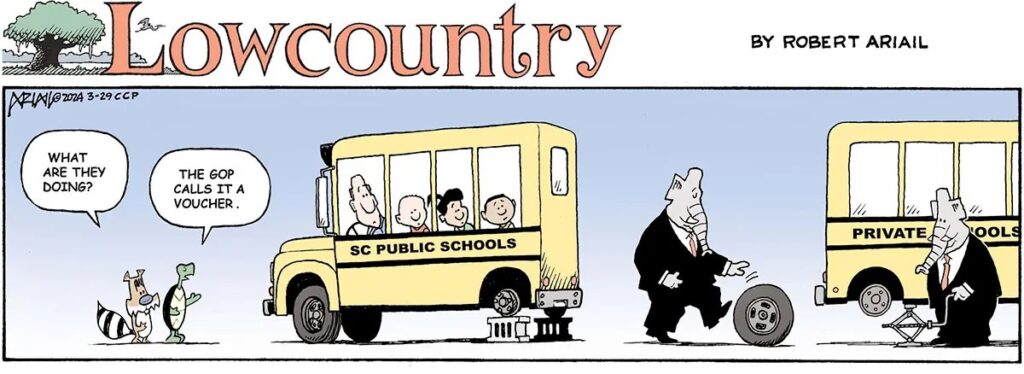
Award-winning cartoonist Robert Ariail generally has a biting or funny comment about the great state of South Carolina in his weekly cartoon. This week, Ariail takes on the pesky issue of private school vouchers – using public money for private schools – that the GOP-led S.C. House continues to push.
- Love the cartoon? Hate it? What do you think: feedback@statehousereport.com.
Justice delayed in S.C. district is justice denied
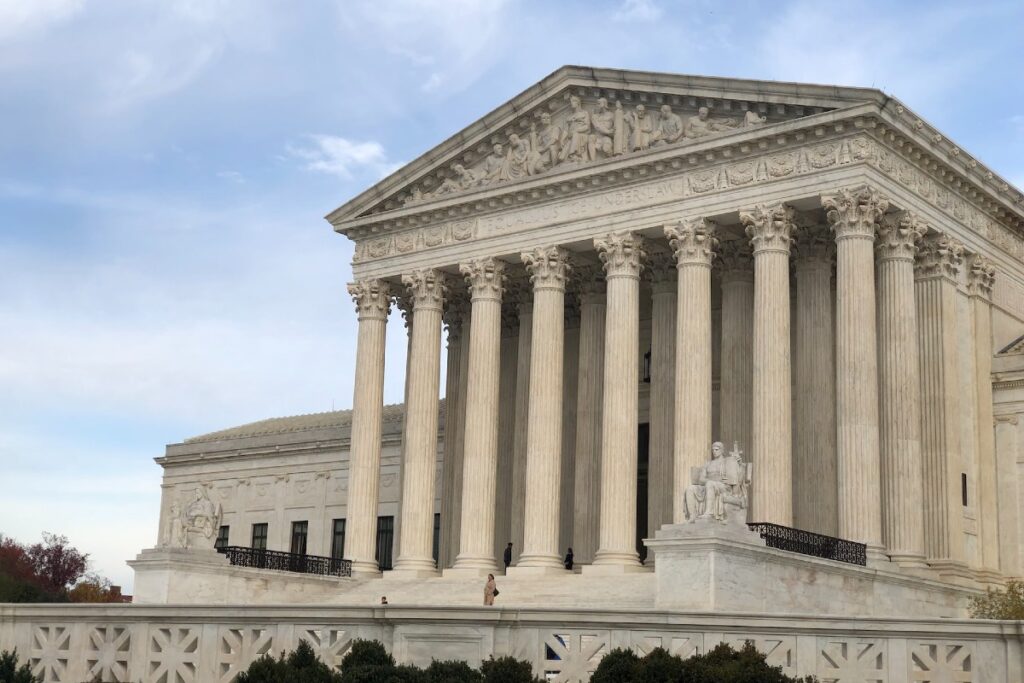
By Andy Brack | A bedrock principle of American-style jurisprudence is that justice delayed is justice denied. It’s the backbone of the right to a speedy trial to redress grievances, right wrongs and bolster the democratic process.
 The concept holds that if one can’t get a decision in a timely manner, that’s the same as having no real decision at all. It’s found in the Magna Carta (1215) and centuries of English law and politics that followed. The Rev. Martin Luther King Jr. wrote of it in his “Letter from Birmingham Jail” by noting “justice too long delayed is justice denied.”
The concept holds that if one can’t get a decision in a timely manner, that’s the same as having no real decision at all. It’s found in the Magna Carta (1215) and centuries of English law and politics that followed. The Rev. Martin Luther King Jr. wrote of it in his “Letter from Birmingham Jail” by noting “justice too long delayed is justice denied.”
Unfortunately, the U.S. Supreme Court seems to have lost sight of this legal fundamental – too busy to be bothered, too busy with politics or too busy trying to slither out of its ethical issues.
On March 28, because the high court had done nothing on a case impacting 30,000 Black South Carolinians, an appellate court said they would just have to wait.
At issue is Alexander v. S.C. NAACP, a redistricting case in which the S.C. State Conference of the NAACP and plaintiff Taiwan Scott argued the S.C. General Assembly’s December 2021 congressional map following the 2020 census was racially discriminatory.
A three-judge panel heard the case the following fall. In January 2023, it unanimously ruled the First Congressional District, which stretches from Charleston County to Beaufort County, was an illegal, racial gerrymandered district that disenfranchised 30,000 Black voters. The judges gave time to the state to draw new lines so elections could be held with a new map.
But the state appealed, as was its right. In October 2023, the U.S. Supreme Court heard oral arguments. Since then? Crickets. So with filing for the 2024 elections set to close April 1, a three-judge district court panel on March 28 essentially said things were moving too slowly and this year’s First District congressional election needed to take place under the current disputed lines.
Which is wrong. And sad. And interesting, since the First District has been one of the most competitive districts in the country – and with the Republican Party having a razor-thin majority, the GOP establishment has a lot of interest in using the old map, not something new that might not favor the incumbent, U.S. Rep. Nancy Mace, R-S.C.
“It’s a ridiculous decision to say, on one hand, that the maps were drawn for racial purposes and, on the other hand, to say we’re going to use them anyway,” said the Rev. Joseph Darby of Charleston, a former top official with the state NAACP. “That’s as strangely American as things get.”
Allen Chaney, legal director for the ACLU of South Carolina, blasted state lawmakers for delaying action by appealing the case: “They manipulated the appellate process to wring out an extra election on unconstitutional maps. I hope voters are paying attention.”
Taiwan Scott, the individual plaintiff in the case, said in a statement that the fight for justice would continue: “The people of our state and our country deserve more than suppression and discriminatory practices. What we deserve is the right to a fair process and an equal say.”
The awkward decision didn’t escape the notice of the two Democrats running to replace Mace.
Michael B. Moore, whose ancestor Robert Smalls was a five-term member of Congress during Reconstruction between 1874 and 1887, said, “Regardless of the congressional map, this race is all about connecting with folks in South Carolina’s coastal communities — and offering them an honest, commonsense alternative to Nancy Mace’s attention-seeking antics and political extremism.”
His primary challenger, Mount Pleasant lawyer Mac Deford, said he was disheartened a decision hasn’t yet been made, but noted: “This is the only congressional district in South Carolina that rejected Donald Trump, and I’ve been fortunate to gain widespread support across political divides, even securing contributions from those who previously supported Nancy Mace.”
If the Supreme Court can make emergency rulings for prisoners on death row, why can’t it set up a process to be quicker on issues related to a dying democratic process?
Andy Brack is editor and publisher of Statehouse Report and the Charleston City Paper. Have a comment? Send to: feedback@statehousereport.com.
AT&T
 The public spiritedness of our underwriters allows us to bring Statehouse Report to you at no cost. Today’s featured underwriter is AT&T Inc.
The public spiritedness of our underwriters allows us to bring Statehouse Report to you at no cost. Today’s featured underwriter is AT&T Inc.
AT&T Inc. (NYSE:T) helps millions around the globe connect with leading entertainment, mobile, high speed Internet and voice services. We’re the world’s largest provider of pay TV. We have TV customers in the U.S. and 11 Latin American countries. We offer the best global coverage of any U.S. wireless provider*. And we help businesses worldwide serve their customers better with our mobility and highly secure cloud solutions.
- Additional information about AT&T products and services is available at http://about.att.com.
- Follow our news on Twitter at @ATT, on Facebook at http://www.facebook.com/att and YouTube at http://www.youtube.com/att.
* Global coverage claim based on offering discounted voice and data roaming; LTE roaming; voice roaming; and world-capable smartphone and tablets in more countries than any other U.S. based carrier. International service required. Coverage not available in all areas. Coverage may vary per country and be limited/restricted in some countries.
Oddest brain teaser ever
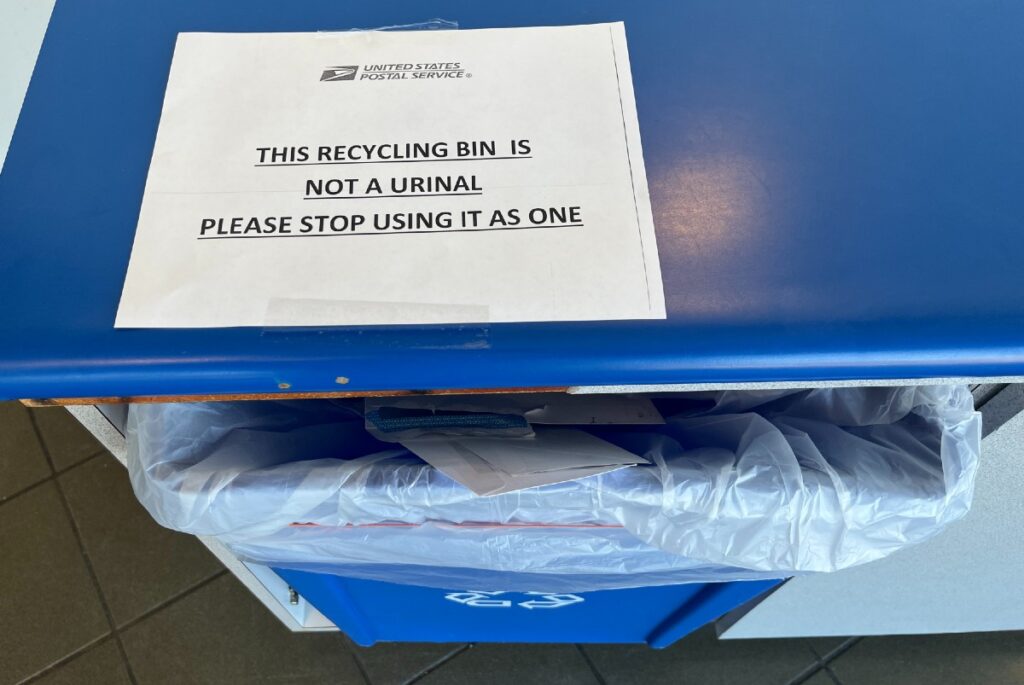
Let us start by noting we don’t expect anyone to get this week’s mystery. But because it’s one of the oddest things we’ve seen in a long time, we thought you would get a giggle or feel a little nauseous when seeing it. Nevertheless, it’s somewhere in Charleston County. But specifically, where? (It’s pretty easy to figure out the why.)Send your name, hometown and guess to: feedback@statehousereport.com.
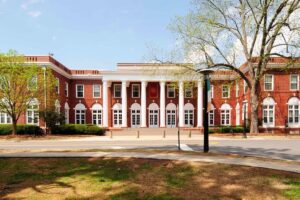 Last week’s photo, “Another big brick building,” was Johnson Hall, as several people noted, on the Winthrop University campus.
Last week’s photo, “Another big brick building,” was Johnson Hall, as several people noted, on the Winthrop University campus.
“It is an old photograph,” said Julia Longshaw, who works at Winthrop. “We used to put up international flags around the campus but have had to discontinue the practice. One of those flags is visible in the photo.”
David Lupo of Mount Pleasant tells us that building started in 1902: “The state provided 20% of the funds, Winthrop president David Bancroft Johnson obtained a pledge of $50,000 from John D. Rockefeller, and the YWCA worked to raise the remaining funds. Rockefeller later contributed an additional $10,000 for a fireproof concrete design and $5,000 to cover the increased cost of materials due to World War I. The building was completed at a cost of $125,000 in 1920, and Winthrop students pushed to have it named for President Johnson.” An auditorium was later added and it was renovated in the 1990s.
Hats also off to Jay Altman and Elizabeth Jones, both of Columbia; Jacie Godfrey of Florence; Jeremy Winkler of Walhalla; Pat Keadle of Wagener; George Graf of Palmyra, Va.; Godfrey Kimball of Athens; and Allan Peel of San Antonio, Texas.
- Send us a mystery picture. If you have a photo that you believe will stump readers, send it along (but make sure to tell us what it is because it may stump us too!) Send to: feedback@statehousereport.com and mark it as a photo submission. Thanks.
Open-carry cartoon is fear-mongering
To the editor:
![]() I don’t appreciate the fear-mongering in this cartoon. How would open carry be any different from all the data of law enforcement over the years? All the years of law enforcement openly carrying sidearms show that responsible people carrying weapons actually deter use at another person, rather than promote it or increase the odds that someone will get shot. Many in law enforcement can make an entire career and never have to aim and fire on another person.
I don’t appreciate the fear-mongering in this cartoon. How would open carry be any different from all the data of law enforcement over the years? All the years of law enforcement openly carrying sidearms show that responsible people carrying weapons actually deter use at another person, rather than promote it or increase the odds that someone will get shot. Many in law enforcement can make an entire career and never have to aim and fire on another person.
There’s also an implication that reckless and unskilled people will now rush to strap on a weapon, being clueless to the truth that such a person is more likely to hurt himself or herself than someone else. I seriously doubt that will happen because people are not that completely dumbed down….yet… that the weight and heft of a weapon won’t be a constant reminder that they’re “out of their league”… that they will immediately jump to a new “normal”…being safe and protected and up to the task if any confrontation arises.
– T.B. Harton, Aiken S.C.
Send us your thoughts
We encourage you to send in your thoughts about policy and politics impacting South Carolina. We’ve gotten some letters in the last few weeks – some positive, others nasty. We print non-defamatory comments, but unless you provide your contact information – name and hometown, plus a phone number used only by us for verification – we can’t publish your thoughts.
-
- Have a comment? Send your letters or comments to: feedback@statehousereport.com. Make sure to provide your contact details (name, hometown and phone number for verification. Letters are limited to 150 words.
- ORDER NOW: Copies are in Lowcountry-area bookstores now, but if you can’t swing by, you can order a copy online today.
- Now available as an e-book!
ABOUT STATEHOUSE REPORT
Statehouse Report, founded in 2001 as a weekly legislative forecast that informs readers about what is going to happen in South Carolina politics and policy, is provided to you at no charge every Friday.
- Editor and publisher: Andy Brack, 843.670.3996
Donate today
We’re proud to offer Statehouse Report for free. For more than a dozen years, we’ve been the go-to place for insightful independent policy and political news and views in the Palmetto State. And we love it as much as you do.
But now, we can use your help. If you’ve been thinking of contributing to Statehouse Report over the years, now would be a great time to contribute as we deal with the crisis. In advance, thank you.
Buy the book
Now you can get a copy of editor and publisher Andy Brack’s We Can Do Better, South Carolina! ($14.99) as a paperback or as a Kindle book ($7.99). . The book of essays offers incisive commentaries by editor and publisher Andy Brack on the American South, the common good, vexing problems for the Palmetto State and interesting South Carolina leaders.
More
- Mailing address: Send inquiries by mail to: P.O. Box 21942, Charleston, SC 29413
- Subscriptions are free: Click to subscribe.
- We hope you’ll keep receiving the great news and information from Statehouse Report, but if you need to unsubscribe, go to the bottom of the weekly email issue and follow the instructions.
- Read our sister publication: Charleston City Paper (every Friday in print; Every day online)
- © 2024, Statehouse Report, a publication of City Paper Publishing, LLC. All rights reserved.















 We Can Do Better, South Carolina!
We Can Do Better, South Carolina!